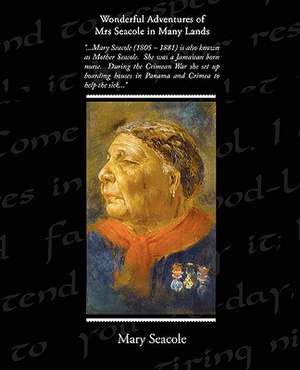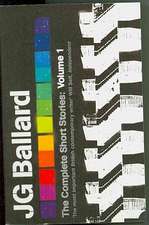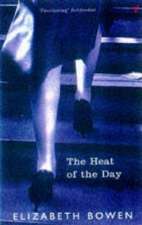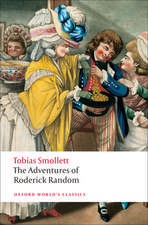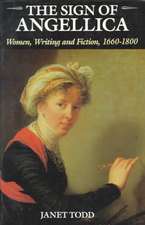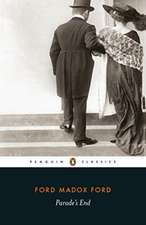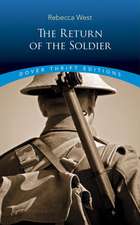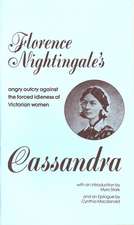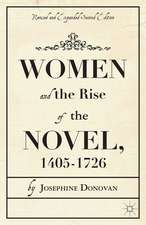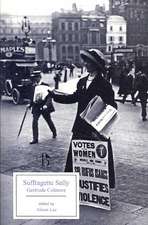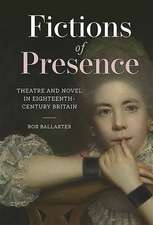Wonderful Adventures of Mrs Seacole in Many Lands
Autor Mary Seacoleen Limba Engleză Paperback – feb 2009
| Toate formatele și edițiile | Preț | Express |
|---|---|---|
| Paperback (7) | 19.81 lei 3-5 săpt. | +5.59 lei 7-11 zile |
| HarperCollins Publishers – 27 iun 2023 | 19.81 lei 3-5 săpt. | +5.59 lei 7-11 zile |
| Dover Publications Inc. – 28 iun 2019 | 31.82 lei 3-4 săpt. | +11.33 lei 7-11 zile |
| Penguin Books – 23 feb 2005 | 53.06 lei 24-35 zile | +18.92 lei 7-11 zile |
| CREATESPACE – | 96.39 lei 3-5 săpt. | |
| Book Jungle – feb 2009 | 129.90 lei 6-8 săpt. | |
| Oxford University Press – 25 apr 1991 | 130.43 lei 31-37 zile | |
| Cambridge University Press – 20 noi 2013 | 278.22 lei 6-8 săpt. | |
| Hardback (1) | 439.33 lei 31-37 zile | |
| Oxford University Press – 28 iul 1988 | 439.33 lei 31-37 zile |
Preț: 129.90 lei
Nou
Puncte Express: 195
Preț estimativ în valută:
24.86€ • 26.07$ • 20.69£
24.86€ • 26.07$ • 20.69£
Carte tipărită la comandă
Livrare economică 01-15 aprilie
Preluare comenzi: 021 569.72.76
Specificații
ISBN-13: 9781438510262
ISBN-10: 1438510268
Pagini: 160
Dimensiuni: 191 x 235 x 9 mm
Greutate: 0.29 kg
Editura: Book Jungle
Locul publicării:United States
ISBN-10: 1438510268
Pagini: 160
Dimensiuni: 191 x 235 x 9 mm
Greutate: 0.29 kg
Editura: Book Jungle
Locul publicării:United States
Descriere
Descriere de la o altă ediție sau format:
Mary Seacole was born a free black woman in Jamaica in the early nineteenth century. In her long and varied life, she travelled in Central America, Russia, and Europe; found work as an inn-keeper and as a `doctress' during the Crimean War; and became a famed heroine, the author of her own biography, in Britain. As this work shows, Mary Seacole had a sharp instinct for hypocrisy as well as ripe taste for sarcasm. Frequently we see her joyfully rise to mock the limitations artificially imposed on her as a black woman. She emerges from her writings as an individual with a zest for travel, adventure, and independence, a stimulating and inspiring figure.
Mary Seacole was born a free black woman in Jamaica in the early nineteenth century. In her long and varied life, she travelled in Central America, Russia, and Europe; found work as an inn-keeper and as a `doctress' during the Crimean War; and became a famed heroine, the author of her own biography, in Britain. As this work shows, Mary Seacole had a sharp instinct for hypocrisy as well as ripe taste for sarcasm. Frequently we see her joyfully rise to mock the limitations artificially imposed on her as a black woman. She emerges from her writings as an individual with a zest for travel, adventure, and independence, a stimulating and inspiring figure.
Notă biografică
Mary
Seacole
was
born
to
a
Scottish
soldier
father
and
free
black
mother
in
Kingston,
Jamaica
in
1805.
She
travelled
to
England
in
the
1850s
after
building
her
reputation
as
a
nurse.
Her
work
in
the
Crimea
during
the
war
earned
her
the
Crimean
medal
and
she
played
a
crucial
role
in
opening
up
the
medical
and
nursing
professions
to
women.
She
died
in
obscurity
in
England
in
1881.
Sara Salih is Assistant Professor in English at the University of Toronto. She is the author of Judith Butler (Routledge 2002), and the editor, with Judith Butler, of The Judith Butler Reader (Blackwell, 2004). She is currently working on a book about representations of 'brown' women in England and Jamaica from the eighteenth century to the present day.
Sara Salih is Assistant Professor in English at the University of Toronto. She is the author of Judith Butler (Routledge 2002), and the editor, with Judith Butler, of The Judith Butler Reader (Blackwell, 2004). She is currently working on a book about representations of 'brown' women in England and Jamaica from the eighteenth century to the present day.
Sara Salih is Assistant Professor in English at the University of Toronto. She is the author of Judith Butler (Routledge 2002), and the editor, with Judith Butler, of The Judith Butler Reader (Blackwell, 2004). She is currently working on a book about representations of 'brown' women in England and Jamaica from the eighteenth century to the present day.
Sara Salih is Assistant Professor in English at the University of Toronto. She is the author of Judith Butler (Routledge 2002), and the editor, with Judith Butler, of The Judith Butler Reader (Blackwell, 2004). She is currently working on a book about representations of 'brown' women in England and Jamaica from the eighteenth century to the present day.
Cuprins
To the reader; 1. My birth and parentage; 2. Struggles for life; 3. My reception at the Independent Hotel; 4. An unwelcome visitor in Cruces; 5. American sympathy; 6. Migration to Gorgona; 7. The yellow fever on Jamaica; 8. I long to join the British army before Sebastopol; 9. Voyage to Constantinople; 10. I start for Balaclava; 11. Alarms in the harbour; 12. The British Hotel; 13. My work in the Crimea; 14. My customers at the British Hotel; 15. My first glimpse of war; 16. Under fire on the fatal 18th of June; 17. Inside Sebastopol; 18. Holiday in the camp; 19. New Year in the Crimea; Conclusion.
